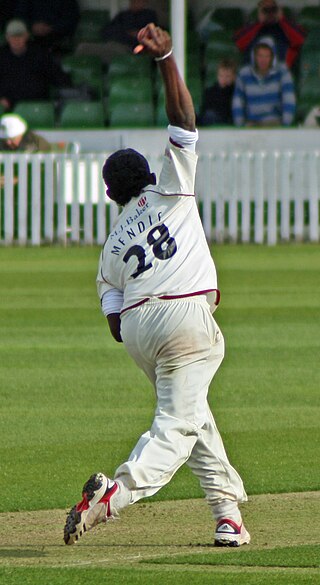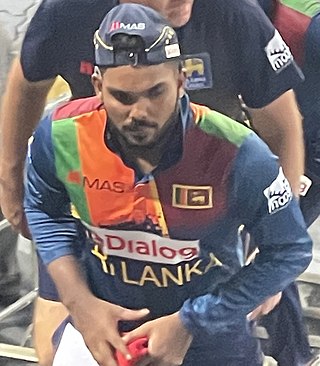Related Research Articles

The 2003 ICC Cricket World Cup was the eighth Cricket World Cup, organised by the International Cricket Council (ICC). It was co-hosted by South Africa, Zimbabwe and Kenya from 9 February to 23 March 2003. This edition of the World Cup was the first to be played in Africa.

The 1996 Cricket World Cup, also called the Wills World Cup 1996 after the Wills Navy Cut brand produced by tournament sponsor ITC, was the sixth Cricket World Cup organised by the International Cricket Council (ICC). It was the second World Cup to be hosted by Pakistan and India but Sri Lanka were hosts for the first time. The tournament was won by Sri Lanka, who defeated Australia by seven wickets in the final on 17 March 1996 at the Gaddafi Stadium in Lahore, Pakistan.
Dandeniyage Somachandra de Silva also known as D. S. de Silva is a Sri Lankan former cricketer, who played Test and One Day International cricket in the 1970s and 1980s. He is the first ODI cap for Sri Lanka, second test cap for Sri Lanka and was part of Sri Lanka's first test team. He bowled leg spin, and on the tour of Pakistan in 1982 he became the first Sri Lankan bowler to take five wickets in a Test innings. He was also the oldest player to lead Sri Lanka in test cricket during a test tour to New Zealand in 1983. He is also regarded as the longest serving spinner to have played for Sri Lanka and considered one of the finest leg spinners to have emerged from Sri Lanka.

The Sri Lanka women's national cricket team represents Sri Lanka in international women's cricket. One of ten teams competing in the ICC Women's Championship, the team is organised by Sri Lanka Cricket (SLC), a full member of the International Cricket Council (ICC).
Basanta Regmi is a Nepalese professional cricketer. An all-rounder, he bats left-handed and is a left-arm orthodox spinner. He made his debut for Nepal against Namibia in March 2006. He was one of the eleven cricketers to play in Nepal's first ever One Day International (ODI) match, against the Netherlands, in August 2018.

Mohammad Imran Tahir is a South African former international cricketer. A spin bowler who predominantly bowls googlies and a right-handed batsman, Tahir played for South Africa in all three formats of cricket.

Shakti Prasad Gauchan is a Nepalese former professional cricketer. An all-rounder, Shakti is a right-handed batsman and a left-arm orthodox spinner. He made his debut for Nepal against Oman in July 2002. In July 2018, he announced that he would retire from international cricket after the conclusion of Netherlands tour. In August 2018, he retired after playing the first ODI of the tour. In December 2018, he retired from all forms of cricket.

Balapuwaduge Ajantha Winslow Mendis better known as Ajantha Mendis is a Sri Lankan former international cricketer who played for Sri Lankan national cricket team in all three formats. He is also known as the "mystery spinner" due to the unusual bowling action variations. In August 2019, he retired from all forms of cricket. Mendis was a member of the Sri Lankan team that won the 2014 ICC World Twenty20.

Lokuge Dinesh Chandimal is a professional Sri Lankan cricketer and a former captain of the Sri Lanka national cricket team. A handy right-handed middle order batter who sometimes plays as the wicket-keeper, Chandimal lead Sri Lanka in the group stages of the 2014 ICC World Twenty20 in which Sri Lanka ended up as the champions.
Paskuwal Handi Tharindu Kaushal is a professional Sri Lankan cricketer who plays for ODIs and Tests in international level. He is a right-arm off break bowler who also bats right-handed. He is a past student of Devapathiraja College, Rathgama.

Sompal Kami is a Nepalese professional cricketer. Kami is a right-handed batsman and a right-arm fast-medium bowler. He is one of the eleven cricketers to play in Nepal's first ever One Day International (ODI) match, against the Netherlands, in August 2018. In January 2019, he became the first bowler for Nepal to take a five-wicket haul in an ODI. He represents the Nepal Army Club of the National League, Jagdamba Giants of the Nepal Premier League, and New Horizon College, which plays in the SPA Cup.

Reeza Raphael Hendricks is a South African cricketer who plays for Gauteng and for the South Africa national cricket team. He is a right-handed opening batsman. He made his international debut for South Africa in November 2014 by becoming only the third South African to score a century on debut.

Karan K.C. is a Nepalese professional cricketer. He was one of the eleven cricketers to play in Nepal's first ever One Day International (ODI) match, against the Netherlands in August 2018. Karan is a right-handed batsman and a right-arm fast-medium bowler. He made his debut against Uganda in January 2015.
Pathira Vasan Dushmantha Chameera is a professional Sri Lankan cricketer who plays for all three formats for the national team, and plays domestically for Nondescripts Cricket Club. He made his international debut for Sri Lanka in January 2015.
Mitchell Josef Santner is a New Zealand international cricketer who plays all forms of the game. Domestically, he plays for Northern Districts cricket team. He is a bowling all-rounder who bats left-handed, and bowls slow left-arm orthodox spin. He has been involved in the highest 7th wicket partnership for New Zealand in Tests. Occasionally he plays, golf as well.

Pinnaduwage Wanindu Hasaranga de Silva, better known as Wanindu Hasaranga, is a professional Sri Lankan cricketer and current T20I captain who plays for the Sri Lanka cricket team in white ball cricket as a bowling All rounder. He is a Right-arm leg spinner. Hasaranga made his international debut for Sri Lanka in July 2017. His elder brother, Chaturanga de Silva, has also represented the national team. Hasaranga made history when he took the first ever hat-trick for Sri Lanka in a T20 World Cup during the 2021 edition of the tournament, and being the first Sri Lankan on an ODI debut to take a hat-trick.
Pasqual Handi Kamindu Dilanka Mendis, popularly as Kamindu Mendis, is a professional Sri Lankan cricketer who plays for the national team, and for Colombo Cricket Club in domestic cricket. He is an ambidextrous bowler and has bowled both right and left-arm deliveries during the same over. He made his international debut for the Sri Lanka cricket team in October 2018.
Morawakage Maheesh Theekshana is a professional cricketer who plays for the Sri Lanka national cricket team in all three formats of the game. He made his international debut for Sri Lanka in September 2021. Regarded as one of the best T20 bowlers in the world, his bowling action resembles that of former Sri Lankan mystery spinner Ajantha Mendis, who coincidentally happened to be his mentor with the Sri Lanka Army Sports Club, whom he has represented in the Sri Lankan domestic game.
In October 1982, a representative team of Sri Lankan cricket players undertook a so-called "Rebel tour" to South Africa, to play a series of matches against the South African team colloquially called the 'cuckoo tour'. At the time, the International Cricket Council (ICC) had placed a moratorium on international cricket teams making tours of South Africa, due to the nation's government policy of apartheid, leaving South Africa with no international competition.
References
- ↑ "53 all out". ESPNcricinfo. Retrieved 26 February 2021.
- 1 2 3 4 "When was the last time a spinner struck with the first ball of a Test innings?". ESPN Cricinfo. Retrieved 16 February 2021.
- ↑ "Flavian Aponso Profile - ICC Ranking, Age, Career Info & Stats". Cricbuzz. Retrieved 26 February 2021.
- 1 2 3 4 "Flavian Aponso 60 not out" . Retrieved 26 February 2021– via PressReader.
- ↑ "Arosa Sri Lanka in South Africa, Oct-Dec 1982". static.espncricinfo.com. Retrieved 26 February 2021.
- ↑ "When the Dutch walloped South Africa". Emerging Cricket. 28 March 2020. Retrieved 26 February 2021.
- ↑ "Re-live: South African rebel tours, 1982-1990". supersport.com. Retrieved 26 February 2021.
- ↑ "The 'Rebel' who flew over the cuckoo's nest". Times Online - Daily Online Edition of The Sunday Times Sri Lanka. Retrieved 26 February 2021.
- ↑ Usmani, Aseed (30 November 2015). "10 of the oldest debutants in cricket". www.sportskeeda.com. Retrieved 26 February 2021.
- ↑ "Flavian Aponso". static.espncricinfo.com. Retrieved 26 February 2021.
- ↑ "Bandula Warnapura: Sri Lanka's first captain in Test cricket". Cricket Country. 6 March 2014. Retrieved 26 February 2021.
- ↑ "Full Scorecard of New Zealand vs Netherlands 4th Match 1995/96 - Score Report | ESPNcricinfo.com". ESPNcricinfo. Retrieved 26 February 2021.
- 1 2 "Old men in a young game". ESPNcricinfo. Retrieved 26 February 2021.
- 1 2 "'My dream was to qualify the Dutch team for the World Cup'". ESPNcricinfo. Retrieved 26 February 2021.
- ↑ "Old Mother Cricket is charged for sabotage". the Guardian. 3 February 2003. Retrieved 26 February 2021.
- ↑ "Records | One-Day Internationals | Individual records (captains, players, umpires) | Oldest players on debut | ESPNcricinfo.com". Cricinfo. Retrieved 26 February 2021.
- ↑ Menon, Mohandas (4 June 2019). "In numbers: Highs and lows of the World Cup". Sportstar. Retrieved 26 February 2021.
- ↑ Menon, Mohandas (12 June 2019). "World Cup: Opening spinners, fastest 150s and other statistics". Sportstar. Retrieved 26 February 2021.
- 1 2 3 "Flavian Aponso's world record is 25 years old today | Daily FT". www.ft.lk. Retrieved 26 February 2021.
- ↑ "Full Scorecard of Netherlands vs Pakistan 17th Match 1995/96 - Score Report | ESPNcricinfo.com". ESPNcricinfo. Retrieved 26 February 2021.
- ↑ "Wills World Cup, 1995/96 - Netherlands Cricket Team Records & Stats | ESPNcricinfo.com". Cricinfo. Retrieved 26 February 2021.
- ↑ "Flavian Aponso – Re-Elected as the President of St. Sebastian's College OBA – UK — SriLankansPuwath - Most Popular Sri Lankan Website in the UK" . Retrieved 26 February 2021.